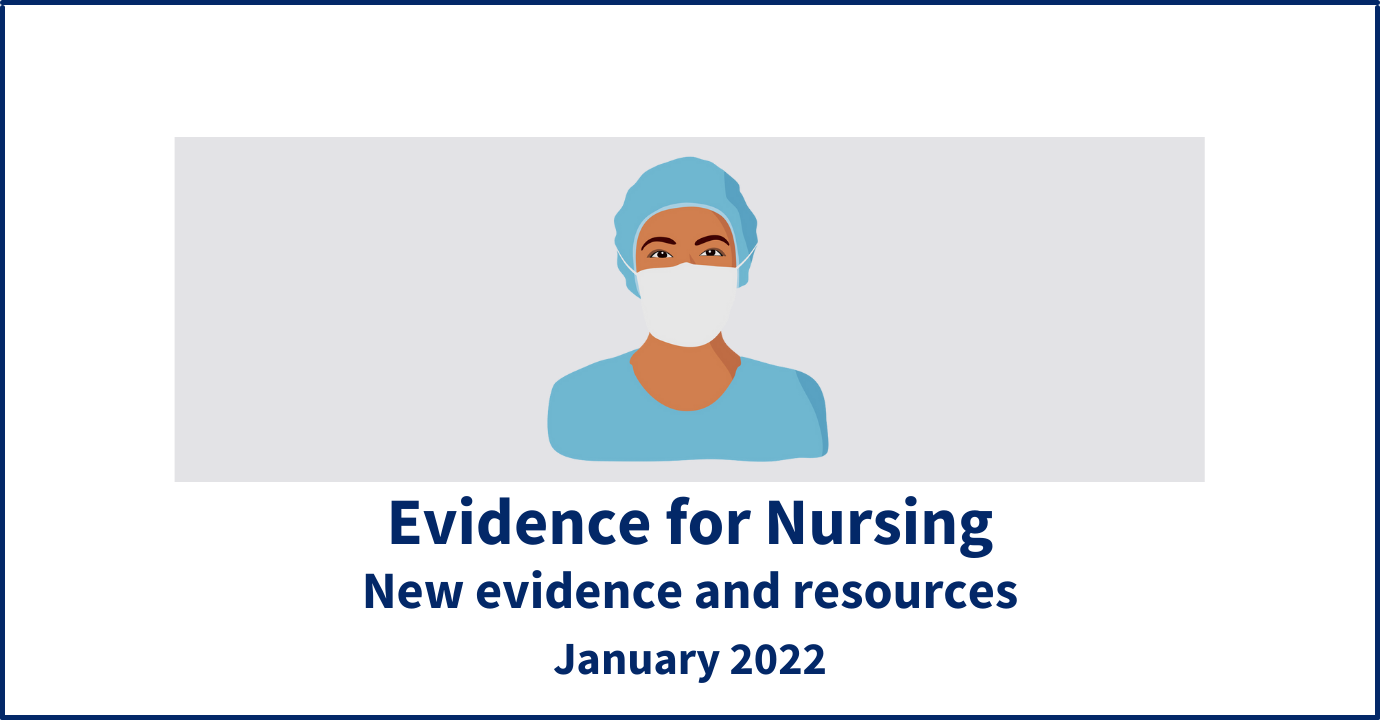The latest evidence and resources for nurses and clinical support staff. You can either scroll through this page or click on any of the links below to jump to the relevant section.
Please note, unlike the rest of our blogs, our Evidence for Nursing: new evidence and resources blogs will not be updated.
- COVID-19
- Bronchiolitis
- Cancer
- Care of the newborn, including preterm infants
- Cervical screening – encouraging uptake
- Communication for adults with an artificial airway
- COPD
- De-implementation of low value health care
- Delirium prevention
- Dementia
- Depression
- Dietary salt for people with chronic kidney disease
- Flu
- Heparin injections: slow versus fast delivery
- Intrauterine insemination
- Life-threatening conditions and emergency care
- Patient questionnaires
- Perioperative non-steroidal anti-inflammatory drugs (NSAIDs) for women having breast surgery
- Preventing surgical site infection
- Reducing medication errors
- Rehabilitation after hip fracture
- Respiratory syncytial virus (RSV) infection in children
- Smoking cessation
- Stroke
- Vaccination uptake
- Vegan diet for primary prevention of cardiovascular disease
- Venous leg ulcers
- Opportuntities and events
.
.
COVID-19
This year, Cochrane is continuing to produce new and updated reviews in response to the pandemic. We have blogged about many of them and this blog COVID-19 evidence: a Cochrane round-up brings together a large collection of evidence and resources, starting from when this evidence was first being produced in spring 2020. Like the reviews themselves, all our blogs are updated to reflect new evidence.
There is a Cochrane news item about Ivermectin: Cochrane’s most talked about review so far, ever. Why?
The impact of measures intended to prevent or reduce the spread of Covid-19 in long-term care facilities have been explored in Non‐pharmacological measures implemented in the setting of long‐term care facilities to prevent SARS‐CoV‐2 infections and their consequences: a rapid review. There is evidence that a number of strategies may reduce the number of infections and related outcomesOutcomes are measures of health (for example quality of life, pain, blood sugar levels) that can be used to assess the effectiveness and safety of a treatment or other intervention (for example a drug, surgery, or exercise). In research, the outcomes considered most important are ‘primary outcomes’ and those considered less important are ‘secondary outcomes’., but more robust evidence is needed. You can read more in the news item Can non-pharmacological measures prevent or reduce Covid-19 (SARS-CoV-2) infections in long term care facilities? and there are a number of related Cochrane Clinical Answers (see reference list).
Cochrane Special Collections
Cochrane Special Collections assemble Cochrane Reviews on important topics for the prevention and treatment of COVID-19. They are developed with experts from our global Cochrane network. They are based on World Health Organization interim guidance, and continuously updated. You can find Coronavirus (COVID-19) Special Collections here.
Cochrane Podcasts
Cochrane COVID-19 Podcasts offer short summaries of Cochrane COVID-19 reviews from the authors themselves. A good way to hear the latest Cochrane evidence in under 5 minutes each.
Cochrane Clinical Answers
Cochrane Clinical Answers (CCAs) provide a readable, digestible, clinically-focused entry point to rigorous research from Cochrane ReviewsCochrane Reviews are systematic reviews. In systematic reviews we search for and summarize studies that answer a specific research question (e.g. is paracetamol effective and safe for treating back pain?). The studies are identified, assessed, and summarized by using a systematic and predefined approach. They inform recommendations for healthcare and research.. They are designed to be actionable and to inform point-of-care decision-making. Each CCA contains a clinical question, a short answer, and dataData is the information collected through research. for the outcomes from the Cochrane Review deemed most relevant to practising healthcare professionals.
You can find Cochrane Clinical Answers related to COVID-19 here.
Bronchiolitis
A new Cochrane Review Parenteral versus enteral fluid therapy for children hospitalised with bronchiolitis (December 2021) with evidence from two studies, with fewer than 1000 hospitalised infants, highlights the need for an expanded evidence-base to inform practice.
As things stand, the authors find that enteral tube feeding probably reduces local complications compared with IV fluid administration. They also find that there was probably a higher rateThe speed or frequency of occurrence of an event, usually expressed with respect to time. For instance, a mortality rate might be the number of deaths per year, per 100,000 people. of success in inserting a feeding tube on first try compared to an intravenous catheter, and probably a lower rate of switching method of fluid delivery.
This is one of the reviews included in our blog Bronchiolitis: evidence and guidance for practice.
Cancer
- The Cochrane Review Music interventions for improving psychological and physical outcomes in people with cancer was updated in 2021.
- It is included in this Evidently Cochrane blog – Bringing harmony to the hospital: music therapies revisited.
- Podcast: Can music interventions benefit people with cancer?
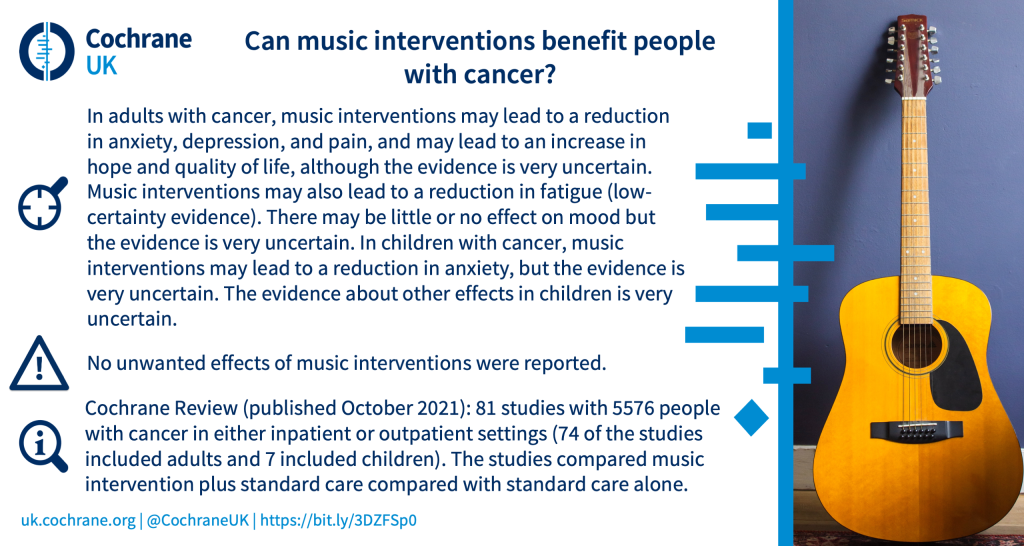
.
.
Care of the newborn, including preterm infants
Avoidance of bottles in establishing breastfeeds in preterm infants
The authors of the Cochrane Review Avoidance of bottles during the establishment of breastfeeds in preterm infants (October 2021) have concluded:
“Avoiding the use of bottles when preterm infants need supplementary feeds probably increases the extent of any breastfeeding at discharge, and may improve any and full breastfeeding (exclusive) up to six months postdischarge. Most of the evidence demonstrating benefit was for cup feeding. Only one studyAn investigation of a healthcare problem. There are different types of studies used to answer research questions, for example randomised controlled trials or observational studies. used a tube feeding strategy. We are uncertain whether a tube alone approach to supplementing breastfeeds improves breastfeeding outcomes.”
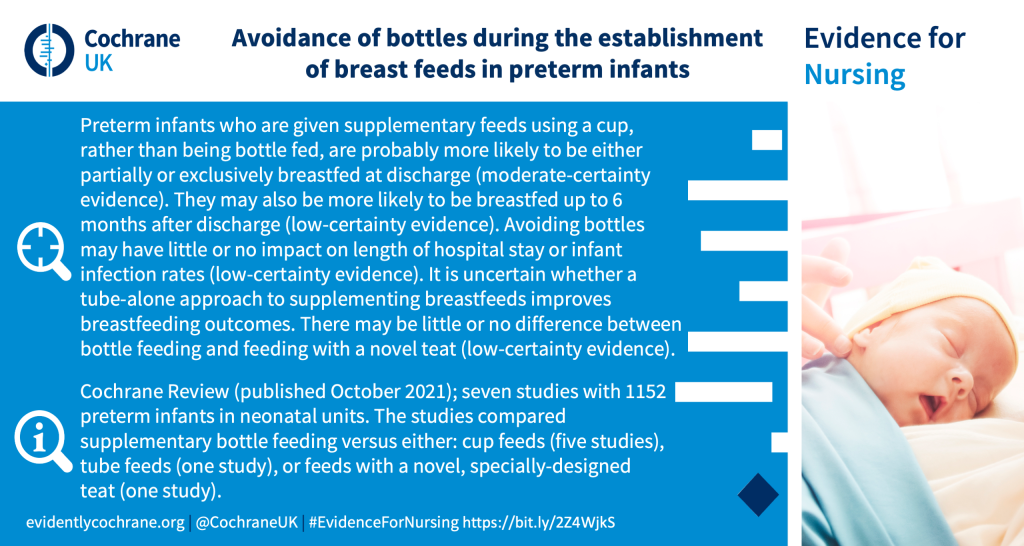
This review has been added to two existing Evidently Cochrane blogs:
- “Yummy, yummy in my tummy, getting big with milk from mummy. Getting preterm babies feeding orally – a roundup of current evidence”
- “Breastfeeding: a round-up of Cochrane evidence”
Cochrane Clinical Answer: For preterm infants, does avoidance of bottles during establishment of breast‐feeding help to increase the extent and duration of breast‐feeding?
Corticosteroids for prevention of bronchopulmonary dysplasia
A Cochrane Review Early (< 7 days) systemic postnatal corticosteroids for prevention of bronchopulmonary dysplasia in preterm infants (October 2021) has been updated. From high-certaintyThe certainty (or quality) of evidence is the extent to which we can be confident that what the research tells us about a particular treatment effect is likely to be accurate. Concerns about factors such as bias can reduce the certainty of the evidence. Evidence may be of high certainty; moderate certainty; low certainty or very-low certainty. Cochrane has adopted the GRADE approach (Grading of Recommendations Assessment, Development and Evaluation) for assessing certainty (or quality) of evidence. Find out more here: https://training.cochrane.org/grade-approach evidence, the review authors have found that systemic postnatal corticosteroids, in the regimens used, have had “significant short‐term and long‐term effects ‐ both beneficial and harmful”.
They conclude that “Early systemic postnatal corticosteroid treatmentSomething done with the aim of improving health or relieving suffering. For example, medicines, surgery, psychological and physical therapies, diet and exercise changes. (started during the first six days after birth) prevents BPD [bronchopulmonary dysplasia] and the combined outcome of mortalitydeath or BPD. However, it increases risks of gastrointestinal perforation, cerebral palsy, and the combined outcome of mortality or cerebral palsy. Most beneficial and harmful effects are related to early treatment with dexamethasone, rather than to early treatment with hydrocortisone, but early hydrocortisone may prevent mortality, whereas early dexamethasone does not.”
Cochrane Clinical Answer: For preterm infants with evolving or established bronchopulmonary dysplasia, what are the effects of systemic corticosteroids administered within eight days after birth?
The Cochrane Review Late (≥ 7 days) systemic postnatal corticosteroids for prevention of bronchopulmonary dysplasia in preterm infants (November 2021) has also been updated. There is high-certainty evidence that “late systemic postnatal corticosteroid treatment (started at seven days or more after birth) reduces the risks of mortality and BPD, and the combined outcome of mortality or BPD, without evidence of increased cerebral palsy. ” But the authors note that there is limited evidence on long-term outcomes, including possible neurodevelopment harms.
Cochrane Clinical Answer: For preterm infants with evolving or established bronchopulmonary dysplasia (BPD), what are the effects of late (≥ 7 days) systemic corticosteroids (CSs)?
CPAP for preterm infants
The authors of a Cochrane Review Nasal continuous positive airway pressure levels for the prevention of morbidity and mortality in preterm infants (November 2021) conclude: “There are insufficient data from randomizedRandomization is the process of randomly dividing into groups the people taking part in a trial. One group (the intervention group) will be given the intervention being tested (for example a drug, surgery, or exercise) and compared with a group which does not receive the intervention (the control group). trialsClinical trials are research studies involving people who use healthcare services. They often compare a new or different treatment with the best treatment currently available. This is to test whether the new or different treatment is safe, effective and any better than what is currently used. No matter how promising a new treatment may appear during tests in a laboratory, it must go through clinical trials before its benefits and risks can really be known. to guide nasal CPAP level selection in preterm infants, whether provided as initial respiratory support or following extubation from invasive mechanical ventilation. We are uncertain as to whether low or moderate‐high nasal CPAP levels improve morbidityillness or harm and mortality in preterm infants.”
There is also a Cochrane Clinical Answer Can prophylactic nasal continuous positive airway pressure help to prevent morbidity and mortality in very preterm infants? for the review Prophylactic or very early initiation of continuous positive airway pressure (CPAP) for preterm infants (October 2021).
Enteral zinc supplementation for preterm neonates
The Cochrane Review Enteral zinc supplementation for prevention of morbidity and mortality in preterm neonates (February 2021) found that “Enteral supplementation of zinc in preterm infants compared to no supplementation or placeboAn intervention that appears to be the same as that which is being assessed but does not have the active component. For example, a placebo could be a tablet made of sugar, compared with a tablet containing a medicine. may moderately decrease mortality and probably improve short‐term weight gain and linear growth, but may have little or no effect on common morbidities of prematurity. There are no data to assess the effect of zinc supplementation on long‐term neurodevelopment.”
Cochrane Clinical Answer: What are the benefits and harms of enteral zinc supplementation for preterm neonates?
Opioid withdrawal in newborn infants
The Cochrane Review Opioid treatment for opioid withdrawal in newborn infants was updated in July 2021 with new trials added and conclusions changed.
Cochrane Clinical Answer: For newborn infants with opioid withdrawal, how does morphine compare with methadone, buprenorphine, phenobarbital, and chlorpromazine?
Preventing bronchopulmonary dysplasia
The Cochrane Review Late (≥ 7 days) systemic postnatal corticosteroids for prevention of bronchopulmonary dysplasia in preterm infants (November 2021) has been updated with more evidence that shows a reduction in mortality at all ages from treatment with late systemic corticosteroids. The evidence for most outcomes is high-certainty. The authors note, however that “the methodological quality of studies determining long‐term outcomes is limited, and no studies were poweredThe power of a trial is the chance that it will correctly detect a real effect of an intervention being tested (for example a drug, surgery, or exercise). Studies with more participants will have greater power. to detect increased rates of important adverse long‐term neurodevelopmental outcomes.”
Cochrane Clinical Answer: For preterm infants with evolving or established bronchopulmonary dysplasia (BPD), what are the effects of late (≥ 7 days) systemic corticosteroids (CSs)?
Surfactant administration for preterm infants with or at riskA way of expressing the chance of an event taking place, expressed as the number of events divided by the total number of observations or people. It can be stated as ‘the chance of falling were one in four’ (1/4 = 25%). This measure is good no matter the incidence of events i.e. common or infrequent. of respiratory distress syndrome
Cochrane Clinical Answer: How does surfactant administration via thin catheter (S‐TC) compare with surfactant administration through an endotracheal tube (S‐ETT) for preterm infants with or at risk of respiratory distress syndrome?
Tube feeding preterm and low birth weight infants
The Cochrane Review Monitoring of gastric residual volume during enteral nutrition (September 2021) concludes that “The evidence is very uncertain about the effect of GRV on clinical outcomes including mortality, pneumonia, vomiting, and length of hospital stay.”
Cochrane Clinical Answers:
- For preterm or very low birth weight infants, how does slow advancement compare with fast advancement of enteral feed volumes?
- How do high‐ and standard‐volume fortified enteral feeds compare for improving outcomes in preterm or low birthweight infants?
- How does continuous nasogastric milk feeding compare with intermittent bolus milk feeding for preterm infants?
- What are the effects of push versus gravity for intermittent bolus gavage tube feeding of premature and low birth weight infants?
Cervical screening – encouraging uptake
The Cochrane Review Interventions targeted at women to encourage the uptake of cervical screening (September 2021) has found that the use of invitation letters probably increases the uptake of cervical screening. Lay health worker involvement amongst ethnic minority populations may increase screening coverage. Uncertainty remains about the effects of most strategies to promote uptake.
Communication for adults with an artificial airway
The Cochrane Review Interventions to enable communication for adult patients requiring an artificial airway with or without mechanical ventilator support (October 2021) has highlighted a lack of evidence to guide practice on choice of communication aid and when to use them.
COPD
ChronicA health condition marked by long duration, by frequent recurrence over a long time, and often by slowly progressing seriousness. For example, rheumatoid arthritis. non‐invasive ventilation
The Cochrane Review Chronic non‐invasive ventilation for chronic obstructive pulmonary disease was published in August 2021. The authors concluded: “Regardless of the timing of initiation, chronic NIV [non-invasive ventilation] improves daytime hypercapnia. In addition, in stable COPD, survival seems to be improved and there might be a short term HRQL [health-related quality of life] benefit. In people with persistent hypercapnia after a COPD exacerbation, chronic NIV might prolong admission‐free survival without a beneficial effect on HRQL.”
Integrated disease management
Cochrane Clinical Answer: What are the effects of integrated disease management (IDM) interventions for people with chronic obstructive pulmonary disease (COPD)?
De-implementation of low value health care
In the Evidently Cochrane blog Choosing health care wisely when resources are scarce Selena Ryan-Vig describes the first in a new series of Cochrane Special Collections which brings together examples of treatments and health care which – despite being costly and time-consuming – research suggests could be unhelpful to patients, or even harmful.
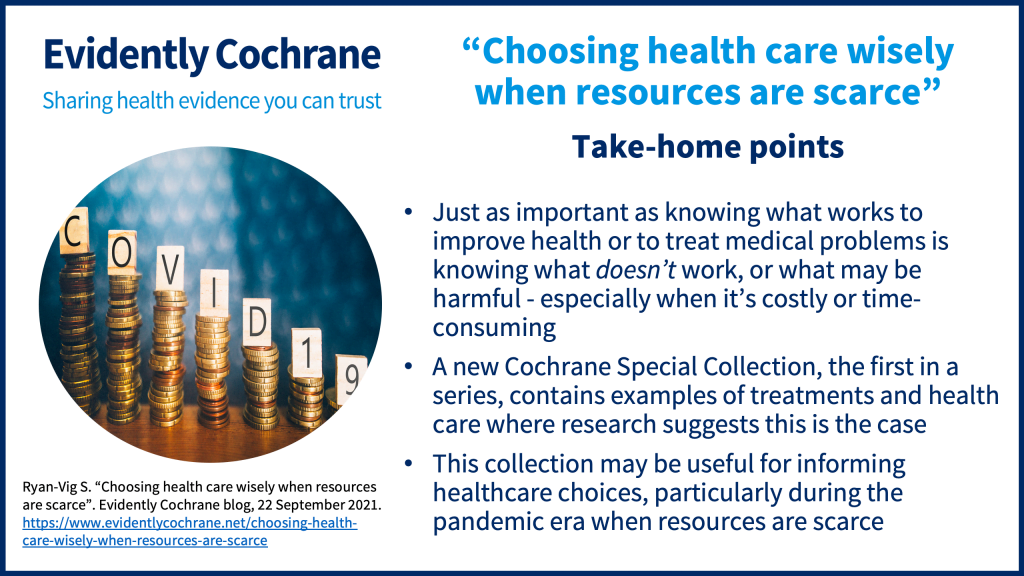
You can also read more in this Cochrane Editorial Making wise choices about low‐value health care in the COVID‐19 pandemic
A new podcast series looks at initiatives to wind back the medical excess that is causing harm to people and the planet. You can find out more on this page: Cochrane Sustainable Healthcare joins forces with the BMJ to explore new ways to make health systems healthier.
Delirium prevention
Delirium is common in hospitalised patients. The authors of a Cochrane Review on Non‐pharmacological interventions for preventing delirium in hospitalised non‐ICU patients (November 2021) have concluded:
- “There is moderate‐certainty evidence regarding the benefit of multicomponent non‐pharmacological interventions for the prevention of delirium in hospitalised adults, estimated to reduce incidenceThe number of new occurrences of something in a population over a particular period of time, e.g. the number of cases of a disease in a country over one year. by 43% compared to usual care.
- We found no evidence of an effect on mortality.
- There is emerging evidence that these interventions may reduce hospital length of stay, with a trend towards reduced delirium duration, although the effect on delirium severity remains uncertain.”
Dementia
- What are the effects of multi‐domain interventions for prevention of dementia and cognitive decline?
- Can palliative care interventions improve outcomes for people with advanced dementia?
Depression
Cochrane AuthorSomebody responsible for preparing and, in the case of Cochrane Reviews, keeping up-to-date a systematic review. The term ‘reviewer’ is also sometimes used to refer to an external peer reviewer, or referee. Q&A: Ketamine as a treatment for depression.
Dietary salt for people with chronic kidney disease
The authors of a Cochrane Review Altered dietary salt intake for people with chronic kidney disease (June 2021) found high-certainty evidence that salt reduction reduced blood pressure in people with chronic kidney disease (CKD), and albuminuria in people with earlier stage CKD in the short‐term. They state that “if such reductions could be maintained long‐term, this effect may translate to clinically significantClinical significance is the practical importance of an effect (e.g. a reduction in symptoms); whether it has a real genuine, palpable, noticeable effect on daily life. It is not the same as statistical significance. For instance, showing that a drug lowered the heart rate by an average of 1 beat per minute would not be clinically significant, as it is unlikely to be a big enough effect to be important to patients and healthcare providers. reductions in CKD progression and cardiovascular events. Research into the long‐term effects of sodium‐restricted diet for people with CKD is warranted.”
Cochrane Clinical Answer: What are the effects of altered dietary salt intake for adults with chronic kidney disease?
Flu
A recently updated Special Collection: Influenza: evidence from Cochrane Reviews.
Heparin injections: slow versus fast delivery
Cochrane Review: Slow versus fast subcutaneous heparin injections for prevention of bruising and site pain intensity (June 2021)
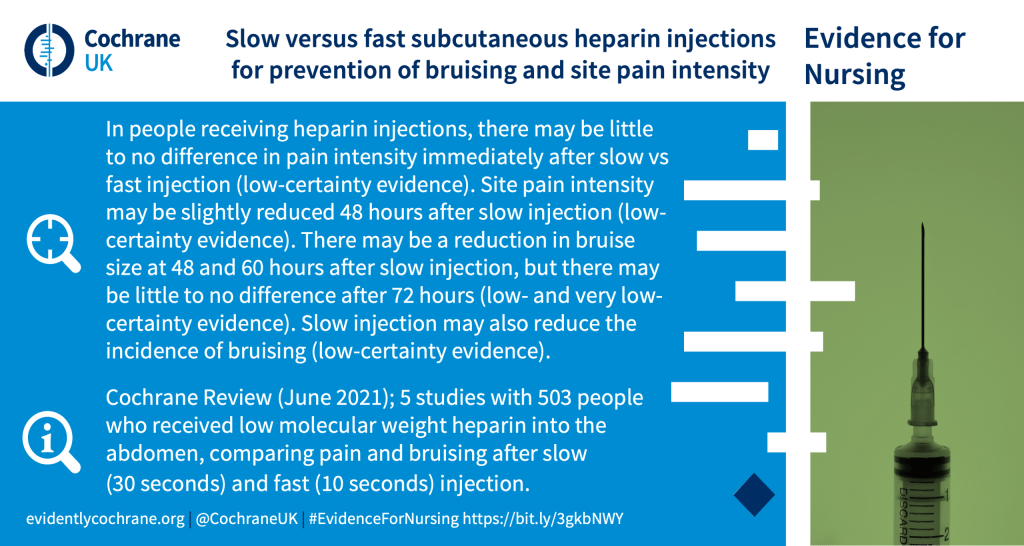
Cochrane Clinical Answer: For people receiving subcutaneous low‐molecular‐weight heparin (LMWH) injections, how does a slow injection compare with a fast injection?
.
Intrauterine insemination
Cochrane Clinical Answer: For women with subfertility, how does double intrauterine insemination (IUI) compare with single IUI in stimulated cycles?
Life-threatening conditions and emergency care
Cochrane Clinical Answer: What are the benefits and harms of interventions to increase patient and family involvement in the escalation of care for community health and hospital settings?
Patient questionnaires
Using patient questionnaires for improving clinical management and outcomes – an interview with Cochrane review author Christopher Gibbons about their recent Cochrane Review to find out whether healthcare workers who receive information from questionnaires completed by their patients give better health care and whether their patients have better health.
Perioperative non-steroidal anti-inflammatory drugs (NSAIDs) for women having breast surgery
The authors of a Cochrane Review on Perioperative systemic nonsteroidal anti‐inflammatory drugs (NSAIDs) in women undergoing breast surgery (November 2021) conclude that “Low‐certainty evidence suggests that NSAIDs may reduce postoperative pain, nausea and vomiting, and postoperative opioid use. However, there was very little evidence to indicate whether NSAIDs affect the rate of breast hematoma or bleeding from any location within 90 days of breast surgery, the need for blood transfusion and incidence of other side effects compared to placebo or other analgesics.”
Preventing surgical site infection
Cochrane Clinical Answer: Does preoperative hair removal reduce postoperative surgical site infection?
Reducing medication errors
A Cochrane Review Reducing medication errors for adults in hospital settings (November 2021) concludes that “Compared to usual care, medication reconciliation, electronic prescribing systems, barcoding and feedback to professionals may reduce adverse drug events or medication errors, or both. Nonetheless, the best modalities to deliver these interventions, and the effect of other interventions, are less clear.”
Rehabilitation after hip fracture
Care and rehabilitation after hip fracture surgery are increasingly in the hands of a multidisciplinary team, and this was explored in a Cochrane Review Multidisciplinary rehabilitation for older people with hip fractures (updated November 2021). There is now evidence that, in hospital settings, rehabilitation after hip fracture surgery delivered by a multidisciplinary team and supervised by an appropriate medical specialist, probably results in fewer cases of ‘poor outcome’. It may also reduce the number of people with poor mobility at 12 months. Its effects (if any) on other outcomes, such as long-term hip-related pain, quality of life, and activities of daily living pain, are uncertain. The impact of supported discharge and multidisciplinary home rehabilitation is also unclear.
Cochrane Clinical Answer: What are the benefits and harms of multidisciplinary rehabilitation (MDR) for older people with hip fracture?
This is one of several reviews included in our blog After hip fracture: how best to help people get back on their feet.
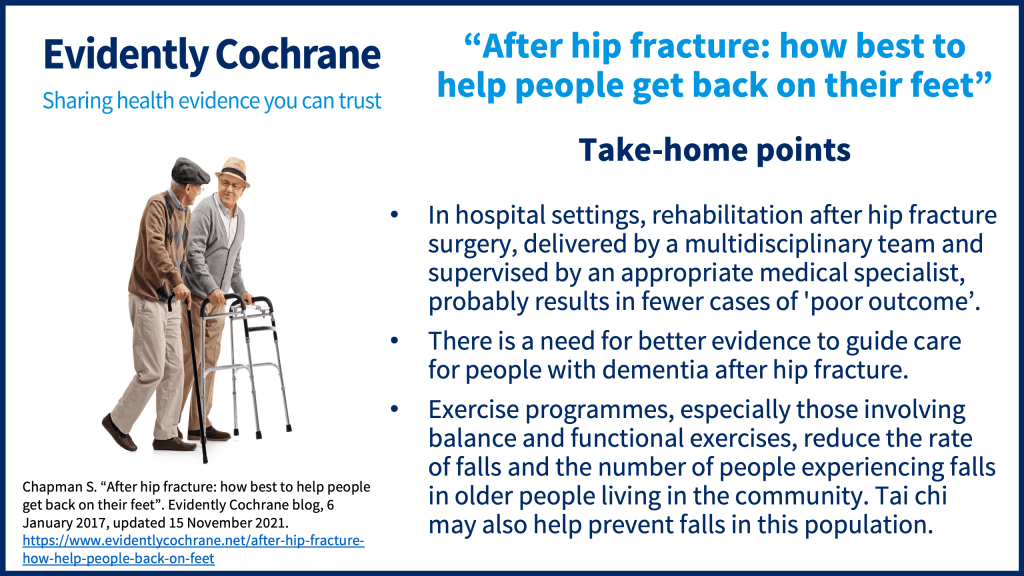
.
.
Respiratory syncytial virus (RSV) infection in children
A Cochrane Review Palivizumab for preventing severe respiratory syncytial virus (RSV) infection in children (November 2021) has found that prophylaxis with palivizumab:
- reduces hospitalisation due to RSV infection
- reduces the number of wheezing days at one year’s follow‐up
- probably results in little to no difference in mortality or adverse events
- probably results in a slight reduction in hospitalisation due to respiratory‐related illness at two years’ follow‐up
- may result in a large reduction in RSV infection at two years’ follow‐up.
Smoking cessation
E-cigarettes
The Cochrane Review Electronic cigarettes for smoking cessation was updated in September 2021.
Here is a summary of the review:
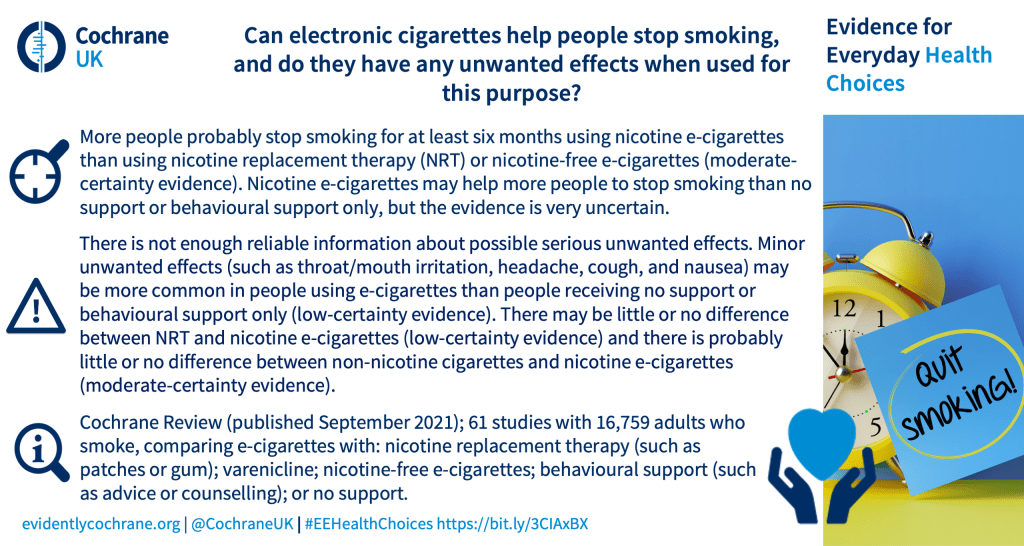
Cochrane Clinical Answer: How effective and safe are electronic cigarettes (ECs) for smoking cessation?
Preventing weight gain
- Cochrane Clinical Answer: Does varenicline or nicotine replacement therapy (NRT) help prevent weight gain after smoking cessation?
- Podcast: Interventions for preventing weight gain after smoking cessation.
Strategies to improve smoking cessation rates in primary care
The Cochrane Review Strategies to improve smoking cessation rates in primary care (September 2021) has found that providing adjunctive counseling by an allied health professional, cost‐free smoking cessation medications, and tailored printed materials as part of smoking cessation support in primary care probably increases the number of people who achieve smoking cessation.
Stroke
Reducing sedentary behaviour
Cochrane Clinical Answer: For people with stroke, what are the effects of interventions to reduce sedentary behavior?
Screening for dysphagia
A new Cochrane Review Screening for aspiration risk associated with dysphagia in acute stroke has been published and reveals an evidence gap. The authors conclude “we were unable to identify a tool that could accurately identify everyone with food and drink entering their airway, as well as detect all those who definitely did not.”
Vaccination uptake
Factors influencing parents’ and carers’ decisions on routine vaccinations
The Cochrane news item What factors influence parents’ and carers’ decisions on routine vaccinations for their children? looks at a new Cochrane Review on this topic. The key messages are:
- “Many factors influence parents’ vaccination views and practices, including those related to individual perceptions, social relationships, and the wider social and political context in which parents live.
- When parents make decisions about vaccination for their children, they are often communicating not just what they think about vaccines, but also who they are, what they value, and with whom they identify.”
From the news item you can jump to the full review and a short implementation guide related to it.
Cochrane Clinical Answer: What factors influence parents’ and informal caregivers’ views and practices regarding routine childhood vaccination?
Interventions to increase uptake of human papillomavirus (HPV) and hepatitis B vaccines
Cochrane Clinical Answer: Which interventions improve vaccination uptake among adolescents?
Vegan diet for primary prevention of cardiovascular disease
Cochrane Clinical Answer: What are the effects of a vegan dietary pattern for primary prevention of cardiovascular disease (CVD)?
Venous leg ulcers
Cochrane Clinical Answer: For people with venous leg ulcers, what are the effects of compression bandages?
Opportunities and events
On this page, Important Cochrane Links, you can find opportunities to get involved, including how to join Cochrane, find volunteer tasks, or jump into the Cochrane Library.
Hundreds of health leaders and experts met on October 14 to recommend the international community urgently mount stronger evidence-based responses to global health emergencies. Recordings from this event are now available on this page: Cochrane Convenes recordings available: the world must learn from pandemic lessons to avoid future catastrophes.
Please note that this page includes a round-up of materials mainly published within the last two months, and is not updated after it’s posted.
Join in the conversation on Twitter with @SarahChapman30 and @CochraneUK or leave a comment on the blog.
Please note, we cannot give medical advice and do not publish comments that link to individual pages requesting donations or to commercial sites, or appear to endorse commercial products. We welcome diverse views and encourage discussion but we ask that comments are respectful and reserve the right to not publish any we consider offensive. Cochrane UK does not fact check – or endorse – readers’ comments, including any treatments mentioned.
Sarah and Selena have nothing to disclose.

